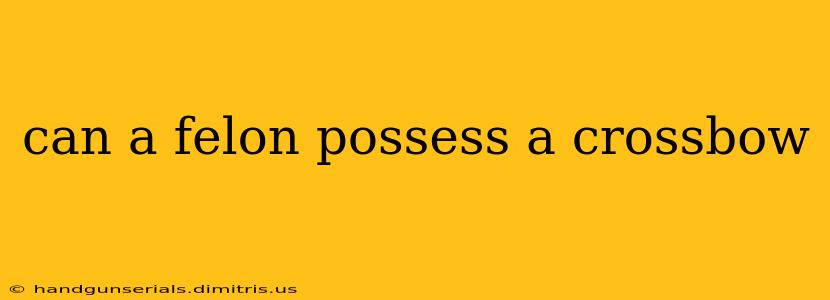The question of whether a felon can possess a crossbow is complex and doesn't have a simple yes or no answer. Federal and state laws vary significantly, and the specifics depend heavily on the nature of the felony conviction, the state of residence, and even the specific definition of "crossbow" under the applicable statutes.
Federal Gun Control Laws and Their Impact
Federal law, primarily under the Gun Control Act of 1968, prohibits convicted felons from possessing firearms. The definition of "firearm" is crucial here. While the law clearly encompasses handguns and long guns, the inclusion of crossbows is less clear-cut. The legal definition of a "firearm" generally hinges on the weapon's mechanism for propelling a projectile—typically involving explosive charges or cartridges. Because crossbows use mechanical force rather than an explosive charge, they frequently fall outside the strict definition of a firearm under federal law.
This doesn't, however, provide blanket permission for felons to own crossbows. The ambiguity leaves room for interpretation and potential prosecution based on other statutes or state laws.
State-Specific Laws: The Key Variable
State laws regarding felon firearm possession vary considerably. Some states adopt a broader interpretation of "firearm" that could encompass crossbows, while others explicitly exclude them. Additionally, certain states may have specific regulations on the possession of weapons by felons that go beyond federal guidelines. It's vital to research the specific laws of the relevant state.
Some states may have waiting periods, background checks, or licensing requirements for even seemingly innocuous weapons, regardless of whether the individual has a felony conviction. Ignoring these regulations can lead to serious legal repercussions.
Factors Influencing State Laws:
- Type of Felony: The severity and nature of the felony conviction often play a significant role. Violent felonies often lead to stricter restrictions compared to non-violent offenses.
- State-Specific Definitions: The legal definition of "dangerous weapon," "deadly weapon," or even "prohibited weapon" can vary greatly between states and include or exclude crossbows.
- Restoration of Rights: Some states offer mechanisms for restoring certain civil rights, including the right to possess weapons, after a felony conviction. This process varies significantly and depends on factors such as the time elapsed since the conviction and adherence to specific conditions.
Seeking Legal Counsel: The Safest Approach
Given the complexity and potential legal ramifications, seeking legal counsel is strongly recommended. A qualified attorney specializing in firearms law can provide accurate and tailored advice based on your specific circumstances, including your felony conviction, state of residence, and the intended use of the crossbow. Self-interpretation of legal documents can be risky and potentially lead to severe consequences.
Conclusion: Proceed with Caution
While federal law doesn't explicitly prohibit felons from possessing crossbows in most interpretations, the potential for prosecution under state laws remains. The specific legal landscape is highly dependent on location and individual circumstances. Therefore, exercising caution and seeking professional legal advice is paramount before acquiring or possessing any weapon, including a crossbow, as a convicted felon. Ignoring these legal complexities can lead to serious penalties, including imprisonment and further legal ramifications.

